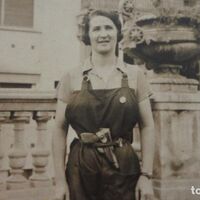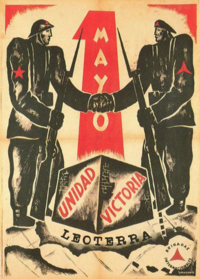Andrea Amores
Andrea Amores | |
|---|---|
 Andrea at 24 | |
| Born | January 31, 1933 Leon, Democratic Republic of Maracaibo |
| Died | August 9, 2011 (aged 78) Kensington, Maracaibo |
| Other names | La Pequeña Pájara (The Little Bird) |
| Citizenship | Maracaibean |
| Occupation | Politician |
| Years active | 1952-1975, 1990-2009 |
| Known for | Syndicalist Direct Action, Feminism, Left Unity Advocate |
| Military career | |
| Allegiance | Maracaibean Syndicalist Volunteers |
| Years of service | 1960-1973 |
| Rank | Supreme Defense Committee member, Propaganda Committee chair, and Comrade-Commander of the Rearguard |
Andrea Amores, also known as La Pequeña Pájara ("The Little Bird") was a Syndicalist and Communist activist and politician from Maracaibo. The only daughter of a deceased Maracaibo Patriotic War partisan, Amores attended university at Maracaibo International School, but dropped out in her third year to pursue politcal activism. Amores is known for her work at recruiting and coordinating the Syndicalist volunteers in Red Leoterra during the North Abyaalan War. After the close of the war and disbanding of the Volunteers, she became influenced with Menghe Communist thought, which she had come into contact with by meeting with Communist volunteers from Menghe. Her firm stance on Left Unity and continued cooperation with the more authoritarian ideology led to her popularity within the Maracaibean Syndicalist Party to drop, with her being stripped of all titles and ousted in the summer of 1975. She faded into political obscurity until after the Decembrist Revolution in 1987, whereupon she publicly renounced her support for the Menghean government, and apologized for her interim views in a private letter to the Syndicalist Party Headquarters. She became a member of the Syndicalist party again in 1990, and remained active until her death in 2011, giving lectures and participating in debates at various institutions.
Early Life
Andrea Amores was born on 31 January, 1933 to Hugo and Soledad Amores in the city of Leon, Maracaibo. Upon the outbreak of war with Dayashina, Andrea's father was one of the first casualties, killed in the Dayashinese air campaign. Her mother signed up to be a miliciana partisan in 1944, in order to protect their homestead. When Leon was overrun by Imperial forces, Andrea and her mother were left behind by the strategic withdrawal of the Republican army. In her memoirs, Andrea notes the final time she saw her mother, as she was stowed away under the floorboards of their home. Andrea survived for months on a meager diet of whatever was in that root cellar until it ran out, often subsisting on rodents, wild grass, and rainwater. She exited the cellar approximately six months later, too starved to remain. Allied troops which had landed discovered her unconsious body near the shoreline, and she was rushed to the nearest field hospital.
Eventually, Andrea made a full recovery, and went on to complete her studies at a provisional secondary school in Maracaibo City after the war. She also attended the now-defunct Maracaibo International School for a degree in Communications, but dropped out midway to pursue the political thought of the Syndicalist party.
Postwar Life
Andrea joined the Syndicalist Party on 9 May 1952, registration number MU157780. She became involved in street pamphleteering, especially to female prospectives. Eventually, she found a position at a party Syndicalist printing press, Las Barricadas and became a contributor. Most of her writings and illustrations could be considered agitprop propaganda. She drew some controversy when one of her columns spoke in a thinly-veiled positive manner about the lynchings of Dayashinese people remaining in Maracaibo. When asked to defend these statements by a reader, she had replied,
She refused to apologize for these remarks until 1999.
Meanwhile, her skill in agitprop garnered the eye of the Central Committee, who voted to invite her into the official propaganda printing committee in 1958. Here, Andrea found the time to write her own pamphlets on women's liberation. She handed these out in addition the the more official flyers, and membership in the Syndicalist party by women around the capital area saw a significant uptick between 1958 and 1960.
North Abyaalan War
In December of 1960, the National Committee convened to create an expeditionary support force for the brewing North Abyaalan War. Andrea was selected to head the International Brigade Propaganda Committee. She was also voted to be the leader of the support and logistics elements of the Brigade in 1961, becoming the youngest and only Comrade-Commander to not be a Pan-Septentrion War veteran.
From 1961 to October of 1972, Andrea directed a pirate radio station situated on Majestuosa, an ocean-going diesel paddleship, which was used to provide popular music to troops fighting in Leoterra, as well as provide secret messages to certain members of the Brigade. The station is where she obtained her alias, The Little Bird, owing to her soft and sensual tone of voice over the radio. From 1965 to 1971, she and her team provided defeatist propaganda to Fyrish forces in Leoterra, offering faux lamentation of their efforts on the continent. Upon learning of the involvment of Dayashinese volunteers on the Fyrish side of the war, she publicly broadcast and addressed their organizer, Kazuo Kikuchi. The broadcast was a measured denouncement of the Dayashinese volunteers, and Kikuchi in particular, explaining the benefits of Syndicalism over Capitalism and how the former will triumph over the latter. The broadcast lasted for approximately 20 minutes, belittling the efforts of Kikuchi and firmly denouncing his alleged crimes during the Pan-Septentrion War.
As the North Abyaalan War came to a close, Andrea produced one of her most memorable pieces of propaganda, celebrating May Day 1973 (pictured right).
Shift to Authoritarian Thought
Visit to Menghe
Renouncement and Teaching
Death and Legacy
Andrea Amores remains a controversial figure within the leftist community of Maracaibo. Some uphold her as a well-meaning heroine, while others dismiss her as a traitor to the cause.

